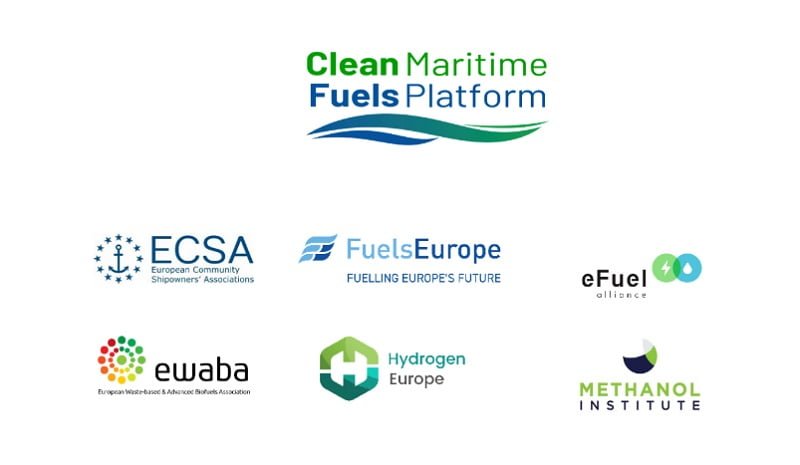In a major step towards the maritime decarbonization, European shipowners and fuel producers have joined forces to launch the Clean Maritime Fuels Platform. The initiative was unveiled on September 12, 2024, bringing together key players in the maritime and fuel sectors to address the critical need for clean fuel alternatives in the shipping industry.
The Clean Maritime Fuels Platform aims to bridge the gap between the shipping industry and fuel producers by fostering communication and collaboration. With the European Union (EU) facing the challenge of decarbonizing its maritime sector—identified in the Draghi report as one of the most difficult sectors to decarbonize—the platform seeks to ensure that clean maritime fuels are accessible, affordable, and produced in sufficient quantities to meet growing demand. The report projects that around €40 billion in annual investments will be needed between 2031 and 2050 to meet the EU’s decarbonization targets.
Addressing Infrastructure and Policy Gaps
The platform is a bottom-up industry initiative designed to support the transition to a net-zero economy by 2050 and the implementation of the EU’s Fit for 55 package. Representatives from major organizations, including the European Community Shipowners’ Associations (ECSA), FuelsEurope, eFuel Alliance, EWABA, Hydrogen Europe, and the Methanol Institute, attended the platform’s inaugural meeting. During the meeting, the group discussed key objectives, including the development of policies and tools to support the production and uptake of clean maritime fuels, the need for infrastructure development, and potential funding opportunities.
Sotiris Raptis, Secretary General of ECSA, emphasized the importance of collaboration in achieving decarbonization goals, stating “Today, the shipping and energy industry join forces and launch a dialogue platform that can facilitate a better flow of information about the common challenges we are facing. We need all hands on deck to make the energy transition happen. In order to meet our targets, we need clean fuels available in the market in sufficient quantities and at an affordable price. European shipowners are proud to launch the Clean Maritime Fuels Platform with fuel producers.”
Supporting Green Transition
Liana Gouta, Director General of FuelsEurope, echoed this sentiment, highlighting the platform’s role in driving Europe’s energy transition “The launch of the Clean Maritime Fuels Platform is a significant milestone in our collective journey towards sustainable shipping in Europe. By bringing together the expertise and innovation of the maritime sector and fuel manufacturers, the platform will explore the opportunities and challenges of the production, supply, and use of renewable and low-carbon maritime fuels.”
The Clean Maritime Fuels Platform will also focus on improving the regulatory framework for clean fuels, which remains a barrier to swift and reliable fuel supply. Ralf Diemer, Managing Director of the eFuel Alliance, emphasized the need for collaboration in this area “Through a regular exchange with other industry representatives and by making concrete proposals to optimize the European regulatory framework, we aim to make immediate progress for the maritime industry and other transport sectors with this initiative.”
A Collaborative Effort for Clean Fuels
The platform is poised to play a crucial role in overcoming technical, operational, and financial barriers to clean fuel adoption. Angel Alvarez Alberdi, Secretary General of EWABA, underscored the importance of collaboration in overcoming these challenges “We believe that a closer collaboration between renewable fuel suppliers and shipowners will significantly reduce technical, operational, and financial barriers across the supply chain for the development and uptake of renewable maritime fuels.”
Hydrogen Europe and the Methanol Institute are also key contributors to the platform, bringing their expertise in hydrogen and methanol-based solutions to the table. Daniel Fraile, Chief Policy Officer of Hydrogen Europe, stressed the importance of international collaboration “European and national policies must be complemented by international policies under the IMO to ensure this is achieved without deteriorating the competitiveness of European industry.”
Greg Dolan, CEO of the Methanol Institute, said “The energy transition is a gradual journey, not an overnight change. It demands a robust regulatory framework and collaboration among all stakeholders involved to drive effective decarbonization. As we work alongside our 100 members through the complexities of this transition, the Clean Fuels Maritime Platform will play a crucial role in accelerating our shift to cleaner fuels and innovative technologies. By combining our collective expertise and efforts, we are not only tackling the pressing need for emission reductions but also laying the groundwork for a more resilient and sustainable maritime industry.”
The Clean Maritime Fuels Platform will hold regular meetings, with ECSA managing the secretariat tasks, ensuring the initiative remains on track to contribute to Europe’s Green Deal and Fit for 55 objectives. As the maritime sector continues to evolve, the platform is expected to play a central role in fostering innovation, overcoming infrastructure gaps, and ensuring the competitiveness of European shipping in the global market.
Clean Maritime Fuels Platform: Key Players
ECSA: Represents 21 national shipowners associations in the EU and Norway, controlling 39.5% of the global commercial fleet and contributing €149 billion to the EU GDP. ECSA works towards creating a regulatory environment that supports the competitiveness of European shipping.
FuelsEurope: Represents the EU’s fuel manufacturing industry, providing expertise on the production, distribution, and use of fuels while contributing to the energy transition and sustainable development.
eFuel Alliance: An interest group promoting political and social acceptance of eFuels and securing regulatory approval. It represents over 170 companies and associations along the eFuel value chain, advocating for CO2-neutral fuel production from renewable sources.
Hydrogen Europe: Represents over 600 companies and stakeholders in the hydrogen sector, working to accelerate Europe’s hydrogen industry and transition towards a carbon-neutral economy.
EWABA: A Brussels-based association representing the waste-based and advanced biofuels industry, promoting the inclusion of biofuels in the EU transport mix for near-term decarbonization.
Methanol Institute: The global trade association representing methanol producers, distributors, and technology companies, advocating for methanol as a key fuel for transportation and power generation.

